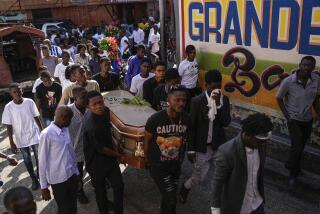Haitian Standoff Ends Bloodlessly
- Share via
PORT-AU-PRINCE, Haiti — In a move applying both force and appeasement, officials of the embattled interim government said Saturday that they had ended an armed standoff with soldiers of the disbanded Haitian army by promising them back wages and jobs in exchange for their weapons.
Although more radical elements of the demobilized army remained at large, both the government of interim Prime Minister Gerard Latortue and a U.N. official here cast the bloodless settlement of the latest security crisis as a resolute display of commitment to disarm any faction menacing public order.
About 100 men in mismatched uniforms bearing antiquated rifles seized the former residence of exiled President Jean-Bertrand Aristide on Wednesday and proclaimed the sprawling compound their new headquarters.
Although the holed-up troops had vowed via cellphone interviews to die rather than surrender, they quickly gave up their weapons and agreed to accept the government’s “reintegration” offer after the U.N. troops stormed the site late Friday, said United Nations spokesman Damian Onses-Cardona.
“This sends a very clear message to all armed factions that they can’t do anything they want,” Onses-Cardona said.
For months, the Brazilian-led U.N. peacekeepers have been grappling with armed pro-Aristide gangs in slums here in the capital as well as with the former soldiers who oppose Aristide.
Many Haitians regard the demobilized troops as both victims and patriots. Although the faceoff in Tabarre, a suburb of the capital, ended peacefully, it incited protests by former military figures and their supporters in scattered rural areas.
Bands of armed rebels and ex-soldiers attacked U.N. peacekeepers in Petit Goave and Miragoane on Friday and Saturday and temporarily ousted police from their stations in the towns of Arcahaie and Mirebalais.
In Tabarre, though, the ex-soldiers proved open to compromise as they grew hungry and exhausted and increasingly felt betrayed by their self-appointed leader, Remissainthe Ravix. The former troops traded their arms for temporary lodging at the National Police Academy and assurances that they would receive unspecified “advances” on their wage claims within a month, said interim Justice Minister Bernard Gousse.
“We agreed to integrate them into current government institutions -- the police force, customs, administrative offices,” Gousse said, adding that those of retirement age would be paid their pensions.
Aristide disbanded the Haitian army in 1995, shortly after a U.S. invasion restored him to power after three years in exile following a military coup. Some of the demobilized troops, fearing further persecution, fled to other countries.
Several dozen former soldiers who had been living in the Dominican Republic, which shares the island of Hispaniola with Haiti, crossed the border early this year to join an armed rebellion that began in the northern city of Gonaives and eventually drove Aristide into a second exile Feb. 29.
Ravix, a former army sergeant who had been discharged even before Aristide disbanded the army, was not among the soldiers taken from the former presidential residence to the police academy for the weekend.
His whereabouts were unknown. He had issued threats against Latortue and National Police Chief Leon Charles and was considered an outlaw, Gousse said.
“The former soldiers felt they had been abandoned,” Gousse said, noting they had been sent by the self-styled “Commander Ravix” to take the Aristide residence but were then left there without food, water or electricity.
By cutting a deal with the bulk of the disgruntled soldiers, the government appeared to have executed a “divide and conquer” maneuver, severing Ravix and his immediate entourage from those with legitimate claims to severance pay or pensions.
Latortue’s transitional government has said from the beginning of its tenure that Aristide’s dismantling of the military is unconstitutional and that the former soldiers’ complaints will be addressed. A decision on whether or how to reinstate the army can be taken only by an elected government, Latortue has said, and elections aren’t expected sooner than the end of 2005.
Paul Magloire, Latortue’s chief of staff, chalked up the confrontation at Aristide’s residence in Tabarre as “an unfortunate outgrowth of impatience.”
A government commission had been tasked with working out interim arrangements for the former soldiers but had moved too slowly, prompting their desperate seizure of the residence, he said.
In the sympathetic uprisings by ex-soldiers in Petit Goave and Miragoane, Sri Lankan peacekeepers were driven from their posts, according to radio reports from the region. U.N. forces in several central towns managed to restore rebel-occupied police stations to Haitian government control, said Daniel Moskaluk of the U.N. civilian police.
He said that one former soldier was killed and two injured in the clashes but that no casualties were suffered by U.N. forces or Haitian police.
More to Read
Sign up for Essential California
The most important California stories and recommendations in your inbox every morning.
You may occasionally receive promotional content from the Los Angeles Times.











